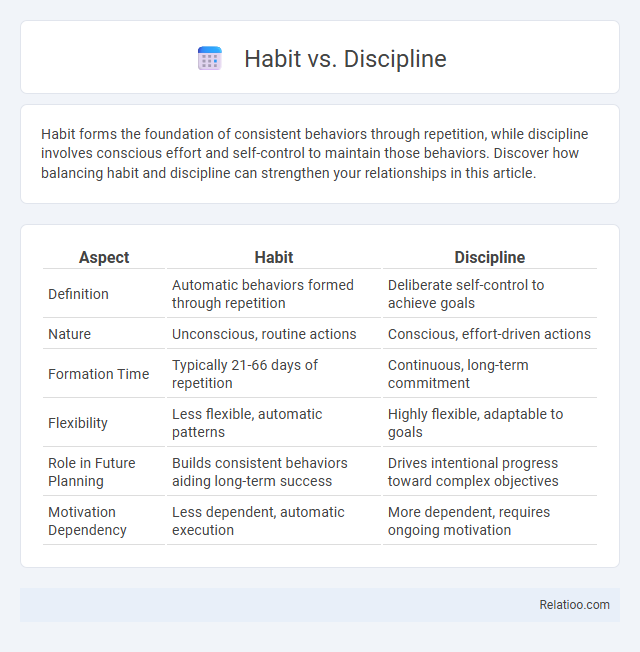Habit forms the foundation of consistent behaviors through repetition, while discipline involves conscious effort and self-control to maintain those behaviors. Discover how balancing habit and discipline can strengthen your relationships in this article.
Table of Comparison
| Aspect | Habit | Discipline |
|---|---|---|
| Definition | Automatic behaviors formed through repetition | Deliberate self-control to achieve goals |
| Nature | Unconscious, routine actions | Conscious, effort-driven actions |
| Formation Time | Typically 21-66 days of repetition | Continuous, long-term commitment |
| Flexibility | Less flexible, automatic patterns | Highly flexible, adaptable to goals |
| Role in Future Planning | Builds consistent behaviors aiding long-term success | Drives intentional progress toward complex objectives |
| Motivation Dependency | Less dependent, automatic execution | More dependent, requires ongoing motivation |
Understanding the Difference: Habit vs Discipline
Understanding the difference between habit and discipline is essential for effective personal development. Habits are automatic behaviors triggered by context or cues, requiring minimal conscious effort, while discipline involves conscious self-control and deliberate actions to achieve long-term goals. Developing discipline enables the formation and maintenance of positive habits, resulting in consistent progress and sustainable success.
The Science Behind Habits
Habits form through repeated behaviors that create neural pathways in the brain, making actions automatic over time. Discipline involves conscious effort and executive control from the prefrontal cortex to maintain consistent behavior despite challenges. Research in neuroscience shows that habit formation relies on the basal ganglia, while discipline engages higher cognitive functions, highlighting the interplay between automaticity and self-regulation.
Discipline: The Power of Consistent Willpower
Discipline harnesses the power of consistent willpower to drive sustained success, forming the backbone of long-term goal achievement. Unlike habits, which are automatic behaviors, discipline requires conscious effort and self-control to maintain focus despite challenges or distractions. Cultivating discipline strengthens mental resilience, enabling individuals to push through obstacles and achieve results that habits alone cannot ensure.
How Habits Form and Influence Behavior
Habits form through repeated behaviors triggered by environmental cues, creating automatic responses that influence daily actions without conscious thought. Discipline involves deliberate effort to override initial impulses and establish long-term goal-oriented behaviors, eventually shaping habits through consistent practice. Understanding the neuroplasticity behind habit formation reveals how repeated actions reinforce neural pathways, making behaviors more ingrained and influential over time.
The Role of Discipline in Achieving Long-Term Goals
Discipline acts as the foundation that sustains your long-term goals by regulating consistent actions beyond initial motivation. Unlike habits, which are automatic behaviors developed through repetition, discipline involves conscious effort and self-control to maintain progress even during challenges. Strengthening discipline enhances your ability to overcome obstacles and ensures that habits align with your ultimate objectives for lasting success.
Habit Formation: Steps to Build Lasting Routines
Habit formation begins with consistent repetition of a specific behavior in a stable context, reinforcing neural pathways that make actions automatic. Establishing clear cues and rewards enhances motivation and anchors new routines in daily life, while tracking progress helps maintain accountability and identify obstacles. Gradual adjustments and patience are critical for transitioning from intentional discipline to effortless habits, ensuring lasting behavioral change.
Discipline Strategies for Daily Success
Discipline strategies for daily success revolve around establishing consistent routines that reinforce productive habits and minimize distractions. Your ability to prioritize tasks, set clear goals, and maintain accountability directly impacts long-term achievement by fostering resilience and focus. Implementing time-blocking techniques and regularly reviewing progress enhances your commitment to disciplined action, ensuring sustained growth and efficiency.
Habit Stacking: Amplifying Results Through Routine
Habit stacking leverages the power of established habits by linking new behaviors to existing routines, enabling you to amplify results without overwhelming effort. This method enhances discipline by creating seamless transitions between actions, making consistency more attainable and sustainable. Incorporating habit stacking into your daily life accelerates progress and maximizes productivity through compounded small actions.
Breaking Bad Habits With Discipline
Breaking bad habits requires discipline, which acts as a deliberate force to override automatic behaviors ingrained in your routine. While habits form through repetition and become subconscious, discipline involves conscious effort to resist impulses and build new, healthier patterns. Strengthening your discipline empowers you to consistently replace detrimental habits with positive actions, leading to lasting behavior change.
Choosing the Right Balance: Habit and Discipline for Personal Growth
Choosing the right balance between habit and discipline is essential for your personal growth, as habits automate positive behaviors while discipline ensures consistency and effort during challenges. Habits form the foundation of daily routines that promote long-term success, whereas discipline fuels motivation and resilience when habits alone are insufficient. Understanding how to cultivate productive habits and apply discipline strategically empowers you to achieve sustained self-improvement and goal attainment.

Infographic: Habit vs Discipline
 relatioo.com
relatioo.com